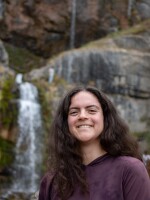Editor’s Note: Quotes in this article appear first in the original spoken Spanish and then in translated English.
Pueden encontrar la versión en español aquí.
—
The paint on Wildon Quispe Lazo’s house in Fillmore, Utah, is yellowed and chipped. Bikes and scooters sit out front, while chickens cluck in a backyard pen. There are leftover ashes in the fire pit from this summer, when the family camped out before the house was ready to live in.
Inside, freshly installed wooden floors span the empty living room. A simple table sits in the dining room, where their 13-year-old daughter draws mountains on printer paper. The windows are new, and Quispe Lazo still needs to seal them before winter.
Most immigrants in Millard County rent, and many squeeze multiple families into one place. Quispe Lazo is proud to have a house in the United States, even though there’s still plenty of work to do on it.
The investment took a leap of faith. The Peruvian put his money toward the house instead of an immigration attorney.
What happens next is in God’s hands, he said.
“Se lo honro a él cada día de mi vida. Y él me enseña a administrar mi dinero, mi fuerza, mi salud, todo”.
“I honor him every day of my life. And he shows me how to manage my money, my strength, my health, everything,” he said.
Quispe Lazo is one of 50,000 people who have pending cases in Utah’s immigration court. There are limited options for immigrants without legal status to become legal permanent residents. One is to apply for asylum, which Quispe Lazo is working on.
Winning asylum is complicated, though, even for specialized attorneys, said Ysabel Lonazco, an immigration attorney and adjunct professor at Salt Lake Community College. Asylum is specifically for people who’ve been persecuted, or fear persecution, because of who they are — like their race, religion or membership in a certain social group.
Quispe Lazo checks in with the government on a smartphone app while he waits for his next hearing. But instead of hiring a lawyer, an opportunity arose to buy a house. He and his wife took it.
“Todo el mundo mandaba dinero para Perú para invertir, pero nosotros pensando invertir acá a pesar con la situación de la, de Donald Trump estaba haciendo acá con los migrantes”.
“Everyone sent money back to Peru to invest, but we decided to invest here, despite what Donald Trump was doing here with immigrants,” he said with a nervous laugh.
Among asylum cases without a lawyer in Utah’s immigration court, only 16% have been approved in the past 20 years. Over half of those with representation, on the other hand, are successful.
One reason the success rate is so much higher for cases with representation is that attorneys only take on ones they think are viable, Lonazco said. The requirements for asylum are specific, so it’s a last resort for when a client has no other path to a green card.
“As tragic as it is, if you have suffered everything, like the worst things you could have suffered in your home country, if they don't meet one of the grounds, the protected grounds, then you have no case,” she said.
To prepare for court, she pores through police reports and researches the conditions in the client’s home country. It’s not just about knowing the law, but telling the client’s story.
Quispe Lazo tried to get legal help. He paid someone he thought was a lawyer to file some documents, but the paperwork never came through. Many bad actors pretend to be attorneys, Lonazco said.
Quispe Lazo lost faith after that.
“Ten cuidado con abogados que se aprovechan de la oportunidad de la necesidad de los migrantes”.
“Be careful with lawyers that take advantage of the opportunity of immigrants’ needs,” he said.
Now, after buying the house, he said he can’t afford an attorney. Hiring someone for an asylum case easily costs upward of $6,000, according to Lonazco. But for Quispe Lazo, the house is an investment. He said even if he can’t live in it, he can rent it out and manage it from anywhere in the world.
Quispe Lazo doesn’t take personal finance lightly. When he’s not fixing up the house, spending time with his two kids or cooking, he reads books and listens to podcasts about spirituality and the stock market.
The investment is for his kids. He wants to pass on the value of hard work, but he hopes they’ll find careers that use their brains more than their hands, like in business or real estate. In Peru, Quispe Lazo designed mining projects. Today he works in meatpacking. His wife works in fast food. He tells his children they’ll accomplish things he wasn’t able to.
Now, after about three years in Utah, Quispe Lazo feels like he’s part of Millard County. Friends come over to play soccer out front, and the mountains are a short drive away.
“A veces con mis hijos me voy allá y digo, ‘Todo Fillmore es mío’”.
“Sometimes I go there with my kids and say ‘All of Fillmore is mine,’” he said with a laugh.
He knows he might have to leave, but Quispe Lazo trusts that there is a divine plan. His family had already found Fillmore, bought a house and met good people as part of it. And while Quispe Lazo understands he’s not perfect and that the path forward will be challenging, he’s optimistic. After all, his faith in God is absolute.
Macy Lipkin is a Report for America corps member who reports for KUER in northern Utah.






